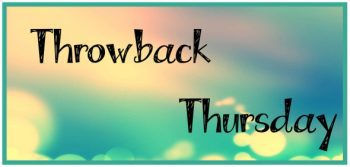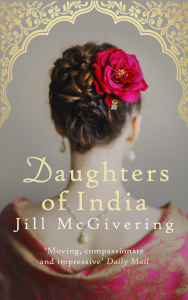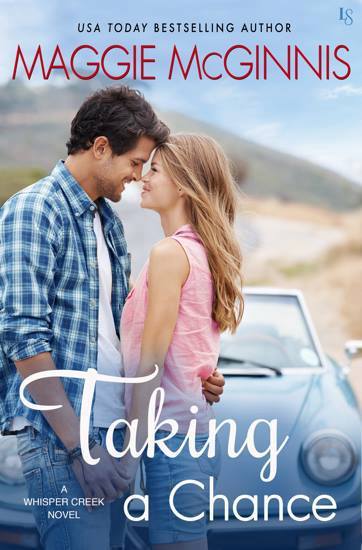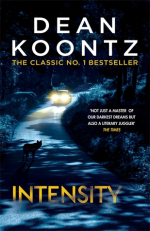An esteemed and long-time friend of mine recently read a healthy chunk of the novel (?) I’ve been working on all year. We discussed a number of things working and not-working with it (including if it even qualifies as a novel) and somewhere toward the end of our talk I began complaining.
My friend waited patiently for me to finish, then bluntly asked if I’m writing to create something purposeful, or just writing for money and fame. And, well, my answer was a bit divided.
Pragmatism and experience have long ago clouded-over the dreams of becoming the next Steinbeck or Kafka, which is not to say that those dreams are non-existent, just that my expectations have lowered. Steinbeck was writing during the – what I’ve heard coined as – Golden Age of American Literature. Since then, our nation’s values have changed enormously – people no longer have the time (or attention) to dedicate to reading a 400-page novel, let alone purchasing it without some guarantee that reading it is worth the energy. Often, folks settle for seeing the movie instead of reading the book. Couple that with the fact that practically anybody can become a writer now, so long as their work is billable — it’s no small wonder that a wannabe-writer, like myself, is trying to serve ten masters. What is the point of all that work, if it doesn’t get sold?
And this is all rather discouraging, I know, but as I answered my friend, these points (and more) punctuated my thoughts. Writing requires hours and hours and hours of work and discipline. It lacks the immediacy of all other art forms and, as a result, is often a very lonely craft. And, though I find a great deal of fulfillment and pleasure in the practice of it, I would also really like to have some money and acknowledgment for my efforts.
Though I explained these things to her, I have a notion that it wasn’t anything she hadn’t already heard. She, being even more of a reader than myself, possesses a pretty good understanding of how the industry works and gently chided me after I was done, It doesn’t work like that, Bill, the writers who get those movie deals are such a slim minority. Just keep writing.
Keep Writing. It’s the best advice.
Anyway, below are three books filled with the words of people who did NOT stop writing. I read these earlier this year and they were, as they say back East, wicked good! (I grade them with ⊕, 1-5)
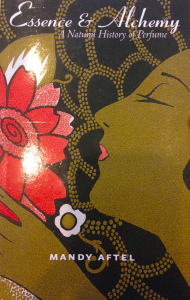
Book Title: Essence & Alchemy: A Natural History of Perfume
Author: Mandy Aftel
Genre: Natural Sciences, Fashion & Design
Goodreads
Renowned perfumer Mandy Aftel explores the primal nature and fundamental importance of aroma in everyday life, teaching people about the nature of smell and the idea of “olfactory consciousness” in Essence and Alchemy: A Natural History of Perfume.
My Thoughts: Initially, I was nervous that Aftel might assume her audience was already in-the-know on the perfume industry and use the jargon without bothering to teach her reader, but this was far from the case. She did an excellent job of explaining how a Nose grades scents (base, middle, top) as well as explaining the basics of the chemistry of smell. Also, she wrote with such rich style it made for a reading that was as sensuous as it was informative. Highly recommend. ⊕ ⊕ ⊕ ⊕ ⊕
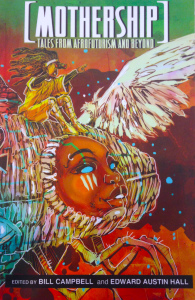
Book Title: Mothership: Tales from Afrofuturism and Beyond
Editors: Bill Campbell and Edward Austin Hall
Genre: Science Fiction, Speculative Fiction
Goodreads
Mothership: Tales from Afrofuturism and Beyond sets a bold new course for anthologies by showcasing the work from some of the most talented writers inside and outside speculative fiction from across the globe. These authors have earned such literary honors as the Pulitzer Prize, the American Book Award, the Hugo, the Nebula, and the Bram Stoker, among others. They have garnered numerous accolades and have sold millions of books around the world. Many of their names are likely to be new to you; Mothership is your invitation to get acquainted with them and their writing.
My Thoughts: What caught my attention with this one (aside from the incredible John Jennings cover art) was the word Afrofuturism. After buying myself a copy, I scuttled home and promptly tore through this anthology. Mothership introduced me to so many sci-fi voices I’d never heard before. I was particularly taken with Charles R. Saunders’ piece, Amma. He uses African-based mythologies as a template to weave this awesome story. And, call me an ignorant white guy, but it never occurred to me that you could do that. I’d never heard of any sci-fi or fantasy writer turning towards the African continent for material and so Amma (and many others within Mothership) was just so refreshing and unexpected. Two thumbs-up on this one. ⊕ ⊕ ⊕ ⊕ ⊕
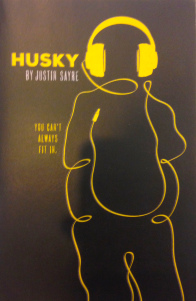
Book Title: Husky
Author: Justin Sayre
Genre: Young Adult, LGBT Fiction
Goodreads
Twelve-year-old Davis lives in an old brownstone with his mother and grandmother in Brooklyn. He loves people-watching in Prospect Park, visiting his mom in the bakery she owns, and listening to the biggest operas he can find as he walks everywhere.
But Davis is having a difficult summer. As questions of sexuality begin to enter his mind, he worries people don’t see him as anything other than “husky.” To make matters worse, his best girlfriends are starting to hang out with mean girls and popular boys. Davis is equally concerned about the distance forming between him and his single mother as she begins dating again, and about his changing relationship with his amusingly loud Irish grandmother, Nanny.
Ultimately, Davis learns to see himself outside of his one defining adjective. He’s a kid with unique interests, admirable qualities, and people who will love him no matter what changes life brings about.
My Thoughts: To preface, I came upon this book by way of Justin Sayre’s variety show (The Meeting of the International Order of Sodomites) and, mistakenly, expected the adult humor and wit that he brandishes in that show to carry-over into Husky. I expected one thing and got something like the opposite. So, I don’t honestly know what my opinion is worth on this one, but it is a very charming story. Sayre’s protagonist, Davis, is on the brink of puberty and doesn’t really get that he’s gay yet. And I think Sayre’s very successful at conveying this without becoming crass or leaning too heavily on stereotypes. LGBT Fiction is a growing genre and, though I’m not real big on YA, I think this one is definitely worth a read. ⊕ ⊕ ⊕
Share this:- More

